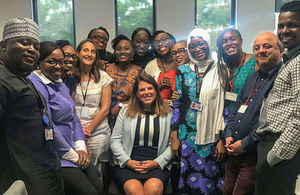Immigration Minister strengthens cooperation with Nigeria on modern slavery
Minister for Immigration, Caroline Nokes, has travelled to Nigeria to visit the new Joint Border Task Force buildings in Lagos.

The Minister for Immigration, Caroline Nokes, has travelled to Nigeria to further strengthen the UK’s efforts to tackle human trafficking and modern slavery. This visit follows Prime Minister Theresa May’s visit to the country last month, where she unveiled a range of support to cut illegal and unsafe migration into Europe from West Africa.
Nigeria is the fifth-largest country of origin for victims of modern slavery in Britain. This abhorrent crime sees men, women and children ensnared by traffickers and brought to Europe, denied their liberty and forced into work, prostitution or criminal activity.
As part of the trip, Caroline Nokes visited the brand-new Joint Border Task Force buildings in Lagos. The Task Force is made up of over 160 officers from both Nigerian and UK agencies, working together to tackle cross border crime such as drug and people trafficking. So far, the team has safeguarded 211 victims of trafficking and arrested 103 suspected traffickers.
Immigration Minister Caroline Nokes said:
Modern slavery is a horrific crime that affects the most vulnerable in society around the world and I am proud to see first hand the world-leading approach the UK is taking to combat trafficking in Nigeria.
It is through cooperation like this between countries across the world that we can grip this issue and do all we can to banish modern slavery to the history books.
Nigeria was among the first to endorse the Prime Minister’s ‘call to action’ to end forced labour and modern slavery, which was launched at the United Nations in 2017.
During the visit, the minister also visited a safe house run by the Nigerian National Agency for the Prohibition of Trafficking in Persons, for rescued victims of modern slavery. Thanks to investment from the Home Office Modern Slavery Fund, the safe house is receiving substantial improvements in order to provide a safe, supportive environment to facilitate victims’ recovery.
The Modern Slavery Fund programme is also supporting Nigerian law enforcement and the judiciary to crack down on the crime, and will provide protection and rehabilitation for victims of trafficking.